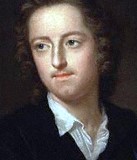| |
|
(An excerpt)
The curfew tolls the knell of parting day,
The lowing herd wind slowly o'er the lea,
The plowman homeward plods his weary way,
And leaves the world to darkness and to me.
Now fades the glimm'ring landscape on the sight,
And all the air a solemn stillness holds,
Save where the beetle wheels his droning flight,
And drowsy tinklings lull the distant folds;
Save that from yonder ivy-mantled tow'r
The moping owl does to the moon complain
Of such, as wand'ring near her secret bow'r,
Molest her ancient solitary reign.
Beneath those rugged elms, that yew-tree's shade,
Where heaves the turf in many a mould'ring heap,
Each in his narrow cell for ever laid,
The rude forefathers of the hamlet sleep.
This poem is in the public domain.
|

Thomas Gray (1716 - 1771) published only 13 poems in the course of his life; this one was, by far, his most successful. Born in England, his home life was sad (an abusive father, and the only one of 12 children to live past infancy). Thomas was frail and introverted, but he enjoyed school and had several close, lifelong friends. He studied law, taught at Pembroke College, and was considered one of the most learned men of his time. Despite his lack of published work, he was offered the position of England’s Poet Laureate, but chose to decline that honor. Thomas is credited with the expression “where ignorance is bliss, ‘tis folly to be wise.”
|
|
Raj Watson:
This pithy poem was mandatory reading (and memorizing) in St. Patrick's High School, Madras/Chennai when I was in grade 9 in 1972. My favorite line: "The paths of glory lead but to the grave." Wannabe dictators: beware of your unholy ambitions! Sooner of later time will compel your cold, lonely churchyard destination. Be wise, be warm, be friend higher thinking and living! ,
Posted 10/29/2025 10:12 PM
|
Stani:
After. 88 years, I woke up and remembered the Curfew, a few phrases and have seen many a mold'ring heapin country churchyards.Such a calmly told reflection on life.
Posted 04/21/2025 03:11 AM
|
Wilda Morris:
Haven't read this poem for a long time. Thanks!
Posted 08/20/2021 11:57 PM
|
carlpalmer:
Thank you, Richard, for suggesting this one, great choice. I just read your poem, Everyday Things in Jayne's new anthology, Poems to Lift You Up and Make You Smile. It certainly did!
Posted 08/20/2021 01:46 AM
|
paradea:
I like this poem!!
Posted 08/19/2021 12:04 PM
|
michael escoubas:
Superb artistry, Richard . . . wonderful for what it is but beyond that, this poetic excerpt is an education in technique.
Posted 08/19/2021 08:35 AM
|
Larry Schug:
Life without cars, computers, streetlights, machine noise, but with a good night's sleep. Interesting bio. of Gray, who is new to me.
Posted 08/19/2021 08:28 AM
|
Randy Cadenhead:
A pearl! Thanks for the commentary.
Posted 08/19/2021 06:21 AM
|
ladyleo191:
I have always loved this poem. It was one of those required in my English class 50 years ago. Thanks for reminding me of Gray's talent.
Posted 08/19/2021 06:02 AM
|
magazinepotato@gmail.com:
I love the sweetness of the first paragraph- The trudgings of others going home for the night leaves the world empty, except for me and the darkness. Lovely :)
Posted 08/19/2021 01:16 AM
|
|
|
|





